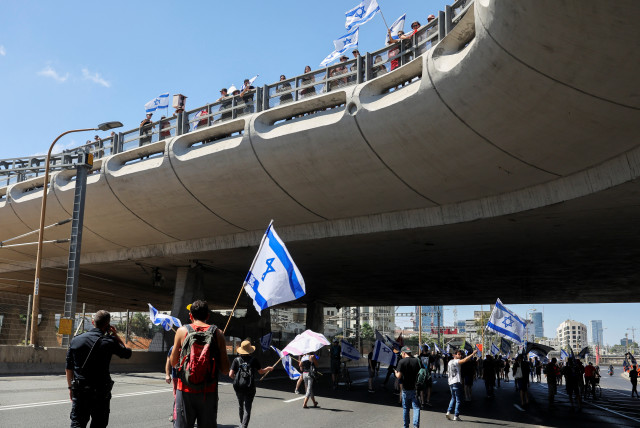How are commuters affected by Israel's 'Day of Resistance'?

The writer was forced to give up his efforts to get to a protest as public transport couldn't get through the road blockages.
I took the wrong bus to the protest. Looking to arrive at the Hemed interchange near Abu Ghosh, I boarded a bus in Tel Aviv at 6:20 am but then realized I was headed the wrong way, so I got off at a station in Modiin, a couple of kilometers South of the interchange, where crowds were surely starting to gather ahead of a planned 7:30 am protest.
Today is the “Day of Resistance,” in Israel, with protests planned from morning to night all over the country in reaction to the Knesset passing the first reading of the Reasonableness Standard Bill on Monday night.
By 7:01 am the day was in full swing at the bus station in Merkaz Modi’in. A man in a red jumpsuit handed me a Yisrael Hayom newspaper as I got off. The headline: “The Boiling Point,” with a picture of Bibi Netanyahu smirking in the Knesset.
If Israel is at its boiling point, you wouldn’t know it just yet here in Modi’in. Commuters come and go. Kids with big backpacks get dropped off for school.
About a fourth of the passersby take a newspaper from the man in the red jumpsuit. When a new bus comes to a stop, he positions himself outside its front, getting ready to throw a newspaper onto the driver’s dashboard when the door opens. Then, he holds the paper up as people walk out the door, looking each of them in the eye.
He gives a silent thumbs up to those who accept his newspaper, usually older-looking women. Most people brush by without a word. Some offer a shake of the head.
It’s only once I approach the man that I realize he is close to 100% deaf. His name is Shai, he tells me, talking in a faint whisper. I have to mouth my words slowly to him to introduce myself. He says he hands out newspapers every morning here.
About one in four people take his newspapers, he says. He can’t really tell if more people are interested in the paper today than usual.
I tell him I’m on my way to one of the protests and he gives me a thumbs up and a grin. Then he walks off to a car that’s just stopped on the roadside. The driver wants a newspaper.
Past 7:30 am now, the bus I was waiting for had yet to come. It turns out that I was standing at the place to get off the bus but to get on a bus, you need to wait on a lower floor.
Eventually, I found the right bus and got on. But five minutes into my ride, we came to a stop at a traffic-clogged junction.
After waiting for about 10 minutes, the driver gave up, announcing that we were going back to the Modiin center. A couple of meters ahead, people stand on the side of the road holding Israeli flags. Perhaps they are stragglers among the group of road-blocking protesters that is sure to be up further.
“No point in going to work today,” he shouts in Hebrew from his driver's seat to the five people aboard the bus. “I’m turning around.”
Protests succeeding in disrupting traffic
It’s here that I stop to appreciate the irony of my situation. I began this journey at six in the morning to go out to an intersection and observe what protests are doing in order to disrupt people’s days. That is the purpose of this highway-blocking resistance: To cause disruption for the sake of commanding attention. Now, while on this bus, I am one of a couple of commuters being forced to turn back, and my journey likely reflects how millions of people began their day in Israel.
Back at the Modiin bus stop, I decide it’s time to cut my losses and head to the Jerusalem Post office to regroup. And to find an iPhone charger.
The Modiin train station is not too far from the bus stop. I get there at 8:55 and the train to Navon station in Jerusalem leaves at 9:06.
But there’s a line at the entrance. The security team here has tweaked their protocol today. Instead of letting backpacks go through the baggage scanner, an officer is inspecting each bag manually.
I pass through security at some point between 9:02 and 9:03. I sprint down the stairs and make it to platform 3 with a few seconds to spare.
Now in Jerusalem, it’s business as usual in the train station. There’s nothing unusual occurring on my walk to the office, for the most part.
Waiting on the opposite side of a crosswalk is an elderly man and a young boy, both carrying Israeli flags. I notice that the boy has no backpack on as they brush by me. It’s nearly 10 a.m, his school must have started about an hour ago. Perhaps he is heading to protest outside the Knesset or to catch a train at the station to Ben-Gurion airport. For him, today is not an ordinary Tuesday, it is the day of resistance.
Jerusalem Post Store
`; document.getElementById("linkPremium").innerHTML = cont; var divWithLink = document.getElementById("premium-link"); if (divWithLink !== null && divWithLink !== 'undefined') { divWithLink.style.border = "solid 1px #cb0f3e"; divWithLink.style.textAlign = "center"; divWithLink.style.marginBottom = "15px"; divWithLink.style.marginTop = "15px"; divWithLink.style.width = "100%"; divWithLink.style.backgroundColor = "#122952"; divWithLink.style.color = "#ffffff"; divWithLink.style.lineHeight = "1.5"; } } (function (v, i) { });

